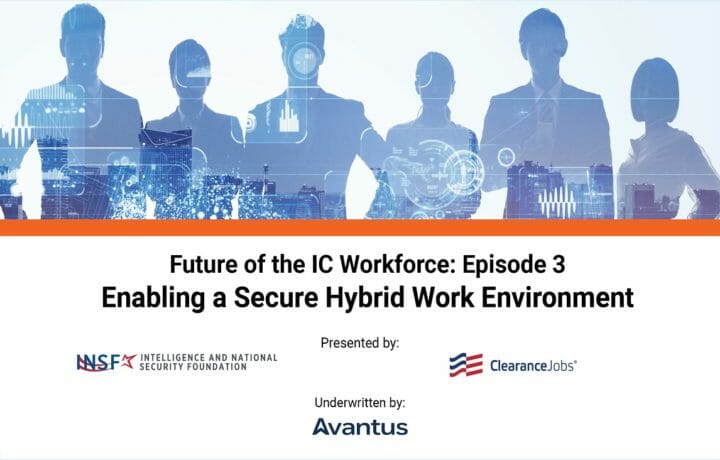The Intelligence Community is going back to work, but that doesn’t mean its business as usual. Even for agencies that continued to need in-person work throughout the pandemic, adjustments in building staffing meant many adjusted to shift work or alternate schedules. Now with vaccinations well in hand, particularly across government facilities, many are considering what the new future of remote work will look like – now that it’s clear flexibility is possible.
In a recent videocast hosted by the Intelligence and National Security Foundation, Marie Falkowski, Chief of Digital Innovation in CIA’s Weapons and Counterproliferation Mission Center and Dr. Eliahu H. Niewood, Vice President of Intelligence & Cross-Cutting Capabilities at MITRE, discussed how they were leveraging technology – and how it will continue to be used to power more flexibility across government work.
“COVID really forced us find ways to work differently while also considering options for the future of work,” said Falkowski. “I’m a huge, huge proponent of taking advantage of talent where it sits.” She emphasized that not every job within the intelligence community requires a security clearance, and the pandemic highlighted areas where talent could be utilized from across the country, specifically research and training missions.
Falkowski also noted how Bellingcat took advantage of open source data to identify Russian intelligence operatives. Government firewalls weren’t required, and they weren’t necessarily collocated with the assets and information they used in their research. This is just one examples of how the success of open source technology has already changed the way the IC works. What the pandemic forced organizations to look at is how the technology that is already out there and used may enable virtual or remote work.
People, Technology, Process: Empowering Flexibility in the IC
“There’s compelling technology, but there’s also compelling things we can do that enable that virtual and remote work,” said Niewood. “There are all of these sources of data out there from unclassified sources. How do we make them more secure, so that even if you’re not in a government facility, we still have confidence no one is watching what you do?” He noted the work of organizations including the U.S. Air Force’s SecureView and deviceONE initiatives, which allowed access to the SIPRNet from remote work environments.
He noted that COVID didn’t just change the way work was done, but has highlighted shifting intelligence priorities. There were lessons learned during COVID, and new vulnerabilities highlighted – including the SolarWinds and Colonial Pipeline cyber attacks.
“There’s a very different set of problems out there, which are also more amenable in some ways to open source information and approaches,” Niewood noted.
While work has shifted, that doesn’t mean the need for classified systems ends – or the need to do classified work in a secure facility. But as the transference becomes more diffuse (aided as much by the growing trend of a 24/hr work day as by COVID-induced remote work) – how can the IC ensure classified work stays contained.
“We’re in the business of intelligence, and that work is inherently classified,” said Falkowski. “You couple that with the diffuse nature of technology….as well as the global availability of the data, and that means we have to be very careful about how we approach our work, how we approach our tradecraft, how we approach our jobs.”
The future of remote work in the IC looks to employ an increasing amount of hybrid and open source technologies. Work doesn’t end when the work day ends, and classification isn’t just about data sets – but can sometimes be the very questions being asked or solutions that are developed.
“When does the fact that I’m asking those questions make my work classified?” said Niewood. “We need to do better about helping people decide where that line is, and what to do about it.”



